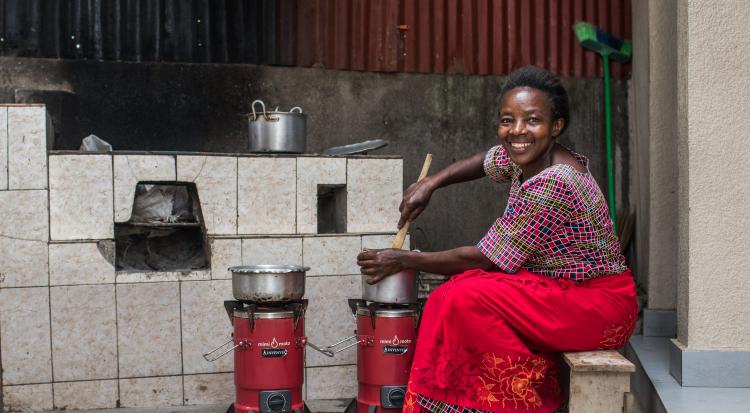Carbon Credits Help Cooks Breathe Easier
While cooking is universal, access to the technology that makes it safe is not. According to the 2020 edition of the Tracking SDG6: The Energy Progress Report, 2.8 billion people still lack access to clean cooking fuels and technologies—meaning that many households around the world are cooking with wood, dung, or charcoal on rudimentary stoves in poorly ventilated rooms—resulting in significant negative impacts for their health. Switching to cleaner fuels not only cleans the air at the household level, but also cleans the atmosphere by reducing emissions from climate pollutants like black carbon and lessening the deforestation that results from collection of wood fuels.
The threats of climate change are well understood—evacuations, destruction of vital infrastructure, and food insecurity caused by climate-related natural disasters; deforestation and biodiversity loss due to rising sea levels and warming temperatures; and as many as 132 million people pushed into poverty over the next 10 years. But less well known is that the benefits of mitigating climate change include more than just the reduction of harmful emissions, like carbon dioxide.
Often called co-benefits, these are the additional, positive outcomes for our health, forests, and economies that come along with climate change mitigation. They include decreased illness and death when household air pollution is reduced as more efficient stoves are adopted; opportunities for women and girls gained when there is less demand on their time to collect solid wood fuels for cooking and heating; and healthier forests with a diminished need for charcoal and wood fuels. The World Bank recognizes the importance of these co-benefits and has committed to featuring them as a key metric in how countries are supported in their efforts to address climate change.
The World Bank’s Carbon Initiative for Development (Ci-Dev) mobilizes private finance for clean energy access in low-income countries. Through the purchase of approximately $76 million in emission reductions, Ci-Dev’s 13 projects across Sub-Saharan Africa and South Asia open new avenues for energy access through results-based climate finance. These projects, however, are also having a profound impact on the health of their beneficiaries.
Ci-Dev programs in Lao People’s Democratic Republic, Madagascar, and Rwanda are helping to reduce the use inefficient cookstoves and the polluting wood fuels, like firewood and charcoal, that power them. By purchasing emissions reductions created from the use of highly efficient cookstoves and supporting local markets for these cookstoves, Ci-Dev is not only helping to reduce emissions, but also helping to reduce the harmful effects of traditional cooking methods.
This health co-benefit is substantial. According to the World Health Organization, illnesses related to household air pollution from inefficient cooking kill nearly four million people prematurely every year—that’s more than malaria and tuberculosis combined. For millions more, these emissions cause cardiovascular and respiratory disease. Women and children are disproportionally affected, as they spend the most time in proximity to stoves and bear much of the burden of cooking.
Biodigesters offer another method for reducing the use of polluting wood fuels. These enclosed structures use bacteria to break down dung from farm animals or food waste. The methane gas that rises to the top of the biodigester dome is clean fuel that can be used for cooking. The nutrient-rich slurry at the bottom of the biodigester is a nutrient rich fertilizer that can be used for agriculture.
In Burkina Faso and Ethiopia revenue from the installation of biodigesters and the carbon is helping to promote their use, make them more affordable, and improve consumer confidence. The use of biodigesters can lower harmful emissions like carbon dioxide, as cleaner, more efficient stoves are used for cooking. They can also increase energy security and household savings, by reducing dependence on scarce, polluting, and expensive solid wood fuels and costly fertilizers. But most importantly for the health of families that use them, biodigesters can greatly reduce indoor air pollution.
The Results-Based Climate Finance (RBCF) that Ci-Dev makes possible is helping to promote the use of biodigesters and cleaner, more efficient cookstoves. While the ultimate goal is the reduction of harmful emissions, for the nearly three billion people worldwide who still rely on solid fuels for cooking and heating, these technologies offer much more: the possibility of a healthier future for themselves and their families.

